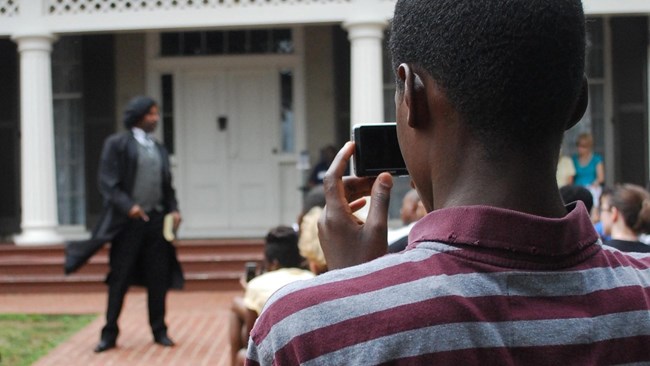
NPS Photo Every year on Independence Day (July 4th), the National Park Service offers visitors the opportunity to come to Cedar Hill, the last residence of Frederick Douglass, to see and hear a performance of his most-famous speech, What to the Slave is the 4th of July?, delivered by a Douglass reenactor on the front porch.This year's event will take place on Tuesday, July 4, 2023 and will also mark the reopening of the Frederick Douglass National Historic Site! Schedule of events
*Starting on July 5th, the home will be open for timed-entry tours Tuesdays, Wednesdays, and Saturdays from 9 am - 5 pm. Advance tickets are strongly encouraged and can be made on www.Recreation.gov 
Public domain Background of the SpeechTaking the platform at Corinthian Hall, Frederick Douglass did not even know his age. Somewhere in his thirties, this titan of history was standing in Rochester, New York to do what he did best – use his words to craft America’s future. In 1852, Frederick Douglass was invited to offer a Fourth of July Address to a gathered audience. He had made quite the name for himself over recent years. Traveling across the United States, he had roused audiences far and wide. The roar of his voice called millions to action rather than complacency. The fire in his eyes left many awestruck, as one witness described him as “majestic in his wrath.” Now, he had risked his own life to publish the evils of enslavement. He gave names, dates, and locations. He spoke so much truth – many could not handle it and on the advice of allies, he fled internationally where he railed for nearly two years against America’s dastardly addiction to trafficking in human flesh. Back in America by the later 1840s, his newspaper The North Star was in operation and Frederick Douglass stood front and center as the dominant voice on the evils of slavery and the need for the United States of America to have a reckoning.For this Fourth of July 1852, America’s most famous Black man was asked to do what he had done many times before: stand on the stage of Rochester’s Corinthian Hall and speak his mind. He agreed, but on one condition. He would speak on the fifth of July, not the fourth. 1852 was an election year. Most Presidents had failed Douglass’s test of humanity as they largely participated in, or at least tolerated, the powers of white supremacy that continued the enslavement of human beings. The 1850 Compromise was fresh in the rear-view mirror as well. This Compromise included a much strengthened so-called, Fugitive Slave Act. To appease enslavers, the Fugitive Slave Act increased the frequency, legality, and compulsion to hunt human beings seeking to control their own destiny. As Douglass railed with his pen and voice against these governmental evils, Harriet Beecher Stowe’s book “Uncle Tom’s Cabin” made its debut. Though a novel, it continued spreading themes mirroring those of which Douglass was speaking. Douglass knew about all this when the invitation to speak arrived. Who did the invitation come from?Douglass was invited by the Rochester Ladies’ Anti-Slavery Sewing Society. These long-time allies of Douglass were deeply involved in his work. These women created the Society the summer before looking to re-ignite and unify scattered anti-slavery efforts in upstate New York. Their charter announced, “Slavery is an evil that ought not to exist, and is a violation of the inalienable rights of man.” They sponsored many of Douglass’s speeches and were anxious to support his North Star newspaper. Mr. Douglass, currently having some financial struggles, was grateful for this partnership to continue this crucial anti-slavery weapon. Rochester Ladies Society’s earliest fundraising went straight to support Douglass’s work. Mr. Douglass’s top business partner, Julia Griffiths, was one of the Society’s first officers and he was a regular speaker at their events. They were great allies.When he confirmed his willingness to come on July 5th – the 25th anniversary of New York state’s full abolition – Douglass had a lot on his mind. The Society sent out invitations: “On Monday, July 5th, at 10 oClock, A.M., The friends of Freedom will Assemble in Corinthian Hall, For the purpose of Commemorating the Glorious Declaration of 1776, Made and signed by the Immortal Band of Hero Patriots, Who for the Maintenance of the Principles set forth in that Declaration, pledged Without Compromise their Lives, their fortunes, and their Sacred Honor. After the reading of the Declaration of Independence, an Oration will be delivered by Frederick Douglass, Once a Slave, but now a firm supporter of the principles of the Declaration. NB. Refreshments may be obtained in the room below the Hall.” The mighty Douglass – self emancipated husband, father, and world-renowned activist - arose confident, committed, and collected. As he pondered the meaning of the Fourth of July to America, he spoke not only to that audience in Corinthian Hall on July 5, 1852. He spoke across time and space, to generations he would never see. He spoke to the future. |
Last updated: July 1, 2023
